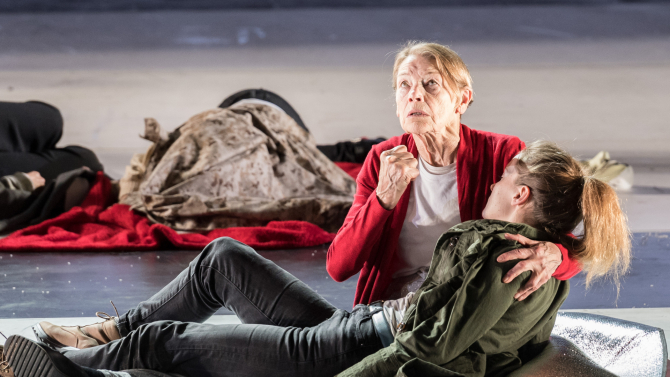Love is blind, so we are told, but are theatregoers? The answer would seem to be yes and no, or dependent on who wants to do what.
There has been a welcome rise in ‘blind casting’ in plays though, on occasion, it may seem a little taxing on the suspension of disbelief – can people really imagine that those on stage actually mistake identical twins when one is male and the other female? Or one black and the other white? Basic biology would suggest that neither is possible. They may be twins, but they sure aren’t interchangeable.
Blind casting is growing in popularity, but it only goes so far – as far as I know all black casts are still the norm for A Raisin In the Sun or Porgy and Bess. This, of course, may justified as a proper revolt over the dubious practice of ‘blacking up’ in the theatre, perhaps most famously and commonly for Othello. But could it cut both ways? Would a white man be cast to play Martin Luther King?
There is also, to revert to my first twins, gender neutrality. Men have routinely taken women’s roles in Shakespeare, often justified on the grounds of ‘authenticity’ – the theatrical equivalent of period orchestras using ‘original instruments’. I have only witnessed one production where the mooted doubling of Cordelia and The Fool was played – the hot pants on the latter, like it or not, ensured it was a very feminine court jester.
Women, though, would miss all the big roles if they were cast by natural selection. This has been addressed – or redressed? - by a number of all female productions to give a kind of balance to the all male ones that pop up from time. A season at the Donmar Warehouse seeks to do just this. But what of the big roles - Hamlet, Othello, King Lear?
Readers of this blog will not be surprised at my interest who gets to play in the mad sovereign.
Two recent productions have been mounted with women as Lear – one definitely as a queen, her royalty enshrined in the play’s title; the other with Glenda Jackson as the monarch who divides her coronet, only later to be crowned with flowers.
It is not my practice to review productions on this blog. My aim is more ruminantary.
The playwright Ronald Harwood, whose play The Dresser, happened to have a West End run about the same time as these two productions of King Lear. The action unfolds place while the failing Sir, at the head of a depleted and second rate cast, is mounting a production of the tragedy in the war torn provinces. Harwood has declared a woman must not play the lead in his play and has reportedly ensured this in his will. And he said more. On the classical piece involved in his drama, Harwood said, ‘A woman as King Lear? It is an insult to the playwright.’
Neither Ursula Mohan (Queen Lear) in a fringe venue nor Glenda Jackson, definitely every inch a king in a packed Old Vic, was insulting, In fact, each of them provided some telling and interesting aspects to the role, even if the productions were variable and at times tricksy. Yes, even with vastly different budgets the highs and lows of productions can thrill or irk.
A woman invoking sterility on her daughter, as the Queen does, seems even more chilling than a father doing so. And a woman being a king seems no big deal when all on stage carry the weight of relationships. Deference is all.
Is it blind or universal? Perhaps both? Or neither? As I said, it depends on who wants to do what. And what the actors do in response to the royal personage.
A couple of years ago I saw a friend of mine played Henry IV on stage at the Sydney Opera House. We had been at acting school together in the 1980s, where we both strutted and strained as students. He has had a successful career in acting, even if he has had to drive cabs from time to time. I have never driven a taxi, but my last foray on the professional stage was over twenty years ago, and some might say that is not long enough in the past.
My friend, David Whitney, said ‘It’s great being a king. You don’t have to do anything. You walk on stage and people do everything for you. If only we knew this thirty years ago.’
David may one day play King Lear. I will, of course, only be his Fool in life. I hope to be in the audience to see it. I expect it will be a very manly event. But then, perhaps, friendship is blind.
There has been a welcome rise in ‘blind casting’ in plays though, on occasion, it may seem a little taxing on the suspension of disbelief – can people really imagine that those on stage actually mistake identical twins when one is male and the other female? Or one black and the other white? Basic biology would suggest that neither is possible. They may be twins, but they sure aren’t interchangeable.
Blind casting is growing in popularity, but it only goes so far – as far as I know all black casts are still the norm for A Raisin In the Sun or Porgy and Bess. This, of course, may justified as a proper revolt over the dubious practice of ‘blacking up’ in the theatre, perhaps most famously and commonly for Othello. But could it cut both ways? Would a white man be cast to play Martin Luther King?
There is also, to revert to my first twins, gender neutrality. Men have routinely taken women’s roles in Shakespeare, often justified on the grounds of ‘authenticity’ – the theatrical equivalent of period orchestras using ‘original instruments’. I have only witnessed one production where the mooted doubling of Cordelia and The Fool was played – the hot pants on the latter, like it or not, ensured it was a very feminine court jester.
Women, though, would miss all the big roles if they were cast by natural selection. This has been addressed – or redressed? - by a number of all female productions to give a kind of balance to the all male ones that pop up from time. A season at the Donmar Warehouse seeks to do just this. But what of the big roles - Hamlet, Othello, King Lear?
Readers of this blog will not be surprised at my interest who gets to play in the mad sovereign.
Two recent productions have been mounted with women as Lear – one definitely as a queen, her royalty enshrined in the play’s title; the other with Glenda Jackson as the monarch who divides her coronet, only later to be crowned with flowers.
It is not my practice to review productions on this blog. My aim is more ruminantary.
The playwright Ronald Harwood, whose play The Dresser, happened to have a West End run about the same time as these two productions of King Lear. The action unfolds place while the failing Sir, at the head of a depleted and second rate cast, is mounting a production of the tragedy in the war torn provinces. Harwood has declared a woman must not play the lead in his play and has reportedly ensured this in his will. And he said more. On the classical piece involved in his drama, Harwood said, ‘A woman as King Lear? It is an insult to the playwright.’
Neither Ursula Mohan (Queen Lear) in a fringe venue nor Glenda Jackson, definitely every inch a king in a packed Old Vic, was insulting, In fact, each of them provided some telling and interesting aspects to the role, even if the productions were variable and at times tricksy. Yes, even with vastly different budgets the highs and lows of productions can thrill or irk.
A woman invoking sterility on her daughter, as the Queen does, seems even more chilling than a father doing so. And a woman being a king seems no big deal when all on stage carry the weight of relationships. Deference is all.
Is it blind or universal? Perhaps both? Or neither? As I said, it depends on who wants to do what. And what the actors do in response to the royal personage.
A couple of years ago I saw a friend of mine played Henry IV on stage at the Sydney Opera House. We had been at acting school together in the 1980s, where we both strutted and strained as students. He has had a successful career in acting, even if he has had to drive cabs from time to time. I have never driven a taxi, but my last foray on the professional stage was over twenty years ago, and some might say that is not long enough in the past.
My friend, David Whitney, said ‘It’s great being a king. You don’t have to do anything. You walk on stage and people do everything for you. If only we knew this thirty years ago.’
David may one day play King Lear. I will, of course, only be his Fool in life. I hope to be in the audience to see it. I expect it will be a very manly event. But then, perhaps, friendship is blind.


 RSS Feed
RSS Feed
